November 12, 2024: In a significant advancement for post-surgical care, researchers at the Indian Institute of Technology (IIT) Ropar have developed a Completely Mechanical Passive Motion (CPM) Machine for knee rehabilitation. This innovative device, which has recently been awarded a patent (Patent No. 553407), is poised to transform the landscape of knee therapy by making it more accessible, affordable, and practical for a wide range of patients, particularly in rural and underserved areas.
IIT Ropar Portable Knee Rehabilitation Mechanical Device Addressing a Critical Healthcare Need
Knee surgeries are common, and effective rehabilitation is crucial for recovery. Continuous passive motion therapy is widely recognized as an essential component of post-surgical care, helping to improve joint mobility, reduce stiffness, and accelerate recovery times. However, traditional motorized CPM machines are often expensive and reliant on electricity, limiting their availability to many patients, especially those living in remote areas with unreliable power supply.
IIT Ropar‘s new mechanical device addresses these challenges head-on. By utilizing a simple piston and pulley system that captures air pressure as the user pulls a handle, the device creates smooth and controlled motion essential for knee rehabilitation without the need for electricity or batteries. This design not only reduces costs but also enhances portability, allowing patients to perform their rehabilitation exercises in the comfort of their homes.
Impact on Accessibility and Affordability
One of the most significant advantages of IIT Ropar’s knee therapy device is its affordability. Traditional motorized CPM machines can be prohibitively expensive, making them inaccessible for many patients. In contrast, this new mechanical device offers a low-cost alternative that can be utilized by a broader demographic. This is particularly important in India, where access to advanced medical technology can be limited, especially in rural regions.
Dr. Abhishek Tiwari, the lead researcher behind this innovation, emphasized its potential impact: “This device has the potential to revolutionize knee rehabilitation in India, where access to advanced medical technology can be limited.” The team’s efforts focus on creating a sustainable solution that not only aids recovery but also minimizes environmental impact associated with motorized devices.
Enhancing Patient Independence
The lightweight and portable nature of the IIT Ropar knee rehab device empowers patients to take charge of their recovery process. By enabling home use, it reduces the need for frequent hospital visits and prolonged stays, which can be both costly and inconvenient. Patients can now engage in their rehabilitation routines at their own pace and comfort, significantly enhancing their overall recovery experience.
A Sustainable Solution for Healthcare
In addition to addressing accessibility and cost issues, IIT Ropar’s mechanical CPM machine aligns with broader goals of sustainability within healthcare. By eliminating reliance on electricity and motors, this device presents an eco-friendly alternative to conventional rehabilitation technologies. This aspect is increasingly relevant as healthcare systems worldwide seek to reduce their environmental footprint while improving patient care.
Future Implications
The introduction of this innovative knee therapy device marks a pivotal moment in healthcare technology. It not only represents a significant step forward in making continuous passive motion therapy accessible to underserved populations but also sets a precedent for future innovations in medical devices aimed at improving patient outcomes.
As IIT Ropar continues to refine this technology and explore its applications further, there is potential for its adoption beyond India, impacting knee rehabilitation practices globally. The research team’s work signifies an important shift towards inclusive healthcare solutions that prioritize both affordability and effectiveness.






